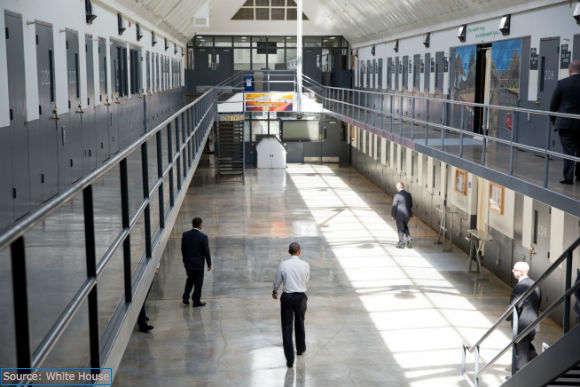
From several years of touring prisons, I’ve learned they all have a distinctive and oddly similar smell: sweat, human misery, and grime — sometimes overlain, but never hidden, by the acrid odors of chlorine and other cleaning products.
The sounds give you a sense of the different parts of the institution. Dorm-style general population units are a constant murmur of activity, with TV programs blending into the sound of people talking, playing cards, microwaving overpriced cups of noodles—anything to pass the idle hours, days, months, and years in custody that lay before them.
I wish he had reached behind a solid steel door to shake the hand of someone in solitary confinement.
Meanwhile, solitary confinement units are filled with the yells of those seeking help, the screams of those battling hallucinations, and the echoing metallic thuds of people banging their hands — or sometimes their heads — against the metal doors of their cells.
But when President Obama visited the El Reno Federal Correctional Institution this week, he did not smell or hear these things.
Everything was clean, quiet, and empty. The president toured a cellblock that had been cleared out — and the floor polished to a spotlessly high sheen — in preparation for his visit. He stepped into an empty cell to see three bunks, neatly folded prisoner uniforms, and a tidy stack of toilet paper rolls.
“Three full-grown men in a 9-by-10 cell,” he .
I wish he had seen the parts of the prison that were not cleaned and emptied. I wish he had reached behind a solid steel door to shake the hand of someone in solitary confinement. Seeing these scenes firsthand would have deepened his experience.
Circumscribed as it was, his visit is still important. It was the first time a sitting president has ever visited a federal prison. And when six carefully selected prisoners were admitted into his protective bubble, he saw the humanity beneath their prison garb. “These are young people who made mistakes that aren't that different from the mistakes I made, and the mistakes that a lot of you guys made,” he . “That's what strikes me — there but for the grace of God.”
Implicit in that statement is the idea that under different circumstances, these young people could have become reporters like the president’s audience or leaders like the president himself. But instead, the government has determined that they will count down their time in a place that the president’s staff has deemed too dirty, too chaotic for him to see for himself.
So, even with this limited glimpse, President Obama was able to see the enormous waste of human potential that mass incarceration creates. He came away knowing that the 2.3 million people who are in prison and jail every day could be doing something better for themselves and for society.
And that insight is enormously important. We do not have to settle for a criminal justice system that is unproductive, wasteful, and dominated by racial disparities. Bad policies are made, and bad policies can be unmade — it just requires that those in power take a look, as President Obama did, and commit themselves to building something better.

